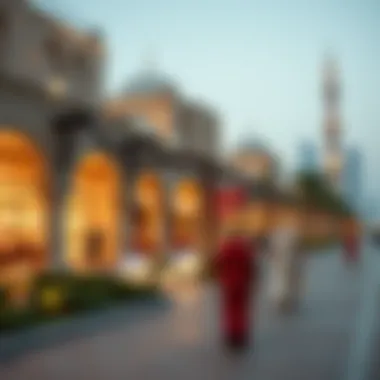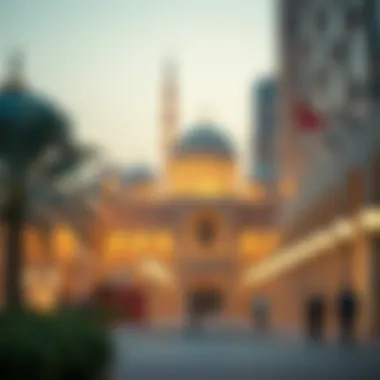Public Holidays in Dubai and Their Real Estate Impact


Intro
Dubai, a city that consistently dazzles with its ambitious skyline and vibrant lifestyle, has a unique blend of traditions and modernity that permeates all aspects of life, including the real estate market. Public holidays play a significant role in shaping the cultural fabric of this cosmopolitan hub. From the jubilant celebrations of Eid to the reflective moments of National Day, each holiday offers a glimpse into the deep-rooted customs that define the Emirati identity. As we delve into the significance of these celebrations, it becomes evident how they not only reflect the ethos of the people but also have tangible effects on the economy and property market.
Through this piece, we will explore various public holidays in Dubai, detailing their cultural significance and examining how these moments of festivity wield influence over real estate dynamics. This exploration is crucial for investors, agents, buyers, and sellers who seek a comprehensive understanding of the unique interplay between tradition and property transactions in the UAE.
In the following sections, we will illuminate current trends in the market, identify key factors influencing property prices, point out areas ripe for investment, and clarify legal considerations for foreign investors. Let's begin by unpacking the market insights that shape real estate in this bustling metropolis.
Market Insights
Dubai's real estate market is a dynamic landscape characterized by its fluctuating trends and vibrant opportunities. Understanding these market insights, especially during public holidays, can provide a strategic advantage.
Current Trends in Dubai Real Estate
As of recent years, the real estate market in Dubai has shown a notable recovery, driven by various factors:
- Increased Demand: There’s been a gradual rise in demand for residential and commercial properties. This can be attributed to the influx of expatriates, many of whom move during the holiday seasons.
- Luxury Market Growth: High-net-worth individuals are increasingly drawn to Dubai, fueling demand for luxury villas and high-end apartments. Festivals like Eid holler an increased focus on opulent living spaces as many families choose these times to upgrade their homes.
- Short-term Rentals Boom: With holidays attracting tourists, there’s a burgeoning market for short-term rental properties. Investors who dabble in platforms like Airbnb see significant activity during holiday periods.
Key Factors Influencing Property Prices
Property prices in Dubai are shaped by various intertwining factors, notably impacted by the rhythm of public holidays:
- Festive Seasons: Holidays like Eid and National Day often lead to short-term spikes in property demand, subsequently affecting pricing trends.
- Government Policies: Initiatives and regulations introduced during or around holiday times can have immediate effects on investor sentiment and buying behavior.
- Cultural Celebrations: The cultural significance of holidays can drive commercialization, influencing local amenities and property values. For instance, homes situated near celebration venues such as parks or malls may demand higher prices.
"Public holidays are more than just time off; they represent a unique opportunity for property investment driven by cultural and market dynamics."
Next, let’s delve into the investment opportunities that arise from the unique context of Dubai's public holidays.
Intro to Public Holidays in Dubai
In the vibrant landscape of Dubai, public holidays serve as much more than just days off work. They are moments where tradition meets modernity, intertwining the rich cultural tapestry of the region with the hustle and bustle of a rapidly advancing urban environment. Understanding these holidays goes beyond acknowledging the calendar; it opens a window into the values and priorities of Emirati society.
The significance of public holidays in Dubai extends to various aspects of life, particularly in how they influence the economy, social engagement, and lifestyle choices. For investors, agents, buyers, sellers, and advisors, this understanding is paramount. These celebrations can sway market dynamics, impacting real estate activities in ways that are sometimes overlooked. A week before Islamic New Year, for instance, might see a spike in property transactions, with individuals eager to finalize purchases in time for the holiday. Hence, recognizing these patterns can equip stakeholders with the foresight to make strategic moves.
Moreover, the diverse nature of Dubai's population means that public holidays encompass a range of cultural practices. Celebrations like Eid al-Fitr, which mark the end of Ramadan, are observed with great fervor, affecting not just the local populace but also expatriates and tourists who partake in these festifications. As such, investors must not only be aware of the holidays but also of the changing sentiments and behaviors tied to them.
The upcoming holiday schedules can provide clues about community engagement, making it essential for those in the real estate market to align their strategies accordingly. Whether it’s about launching promotional campaigns or understanding which property types might attract interest during festive times, entering the holiday season with a well-informed approach can yield significant benefits.
Overview of Major Holidays
In Dubai, public holidays hold a significant place in the social and economic tapestry of the city. These holidays are not just days off but represent a rich blend of tradition, spirituality, and community spirit. The implications of these holidays stretch beyond cultural observances; they significantly affect the economic landscape, particularly real estate.
Importance of Understanding Public Holidays


Recognizing the major holidays is crucial for investors and stakeholders in the real estate market. The timing of property transactions can often align with these festive periods, revealing trends or fluctuations in buyer activity. Consider the end of Eid al-Fitr, for example. After this holiday, many families flood the market in search of larger homes as they settle into post-festivity routines. It is not uncommon for purchasing decisions to be influenced by interpersonal connections that are strengthened during these times.
Furthermore, public holidays are also a double-edged sword. While they may create bustling activity in certain sectors, they may also lead to temporary lulls in property transactions due to closures of offices and banks.
Understanding these holidays can be the difference between capitalizing on a peak in real estate activity or missing out on opportunities when the market slows down. Hence, a nuanced comprehension is indispensable for anyone trying to navigate the Dubai property landscape.
"Public holidays in Dubai aren’t just dates on a calendar—they're pivotal moments that drive both community engagement and market dynamics."
In the following sections, we will take a closer look at each of the major holidays observed in Dubai, including the Islamic New Year, Eid al-Fitr, Eid al-Adha, National Day, and the birthday of the Prophet Muhammad. Each holiday brings its unique cultural significance, and understanding these can enhance one’s ability to strategize within the real estate market.
Cultural Significance of Holidays
Public holidays in Dubai are not just days off work; they are vibrant expressions of the emirate's cultural tapestry. Each holiday has its roots in tradition, religion, or national pride, shaping the social fabric of the community. Understanding the cultural significance of these holidays is essential for investors, buyers, and real estate professionals looking to navigate the market effectively. Public celebrations foster a sense of belonging among residents and contribute to the overall appeal of the emirate as a tourist destination. Therefore, the significance of holidays stretches beyond mere observance; it intersects with lifestyle and economic dynamics.
Celebration Rituals and Practices
The rituals associated with each public holiday are rich and diverse. For example, during Eid al-Fitr, families come together to share meals and exchange gifts, a practice that underscores generosity and unity. In preparation, individuals engage in Zakat (charity), reinforcing social responsibility among the community. Streets come alive with decorations, and mosques fill with worshippers, creating an atmosphere charged with festivity.
Similarly, National Day is marked by parades and cultural displays, where flags wave high and community spirit shines. The festivities often involve showcasing traditional Emirati arts, and they foster a renewed sense of loyalty and pride in one's heritage. For investors, observing these practices can provide insights into marketing strategies and community engagement opportunities during these significant periods.
A celebration isn’t just a time off work; it’s a chance to tap into the heart of the community and glean useful cues about its values and needs.
Community Engagement and Traditions
Community engagement during public holidays promotes the spirit of togetherness. During Islamic New Year, neighborhood activities encourage bonding among families, often extending to charitable efforts. This cultural intermingling creates networks that can be beneficial in the real estate context; networking plays a pivotal role in generating leads and referrals. For instance, a well-timed community event during a public holiday could yield fruitful connections for real estate agents or investors.
Moreover, local traditions facilitate brand awareness and encourage communal participation. Eid al-Adha, for instance, is often marked by animal sacrifice and distribution of meat to those in need, showcasing the values of generosity and support in the society. Property developers and agents might find this an opportune moment to engage with the community, perhaps by sponsoring local events or participating in charitable appeals, thus enhancing their visibility while contributing positively to the local culture.
Overall, the significance of public holidays in Dubai goes far beyond the calendar. They provide an avenue for understanding the intercultural dynamics, customer preferences, and community relationships that drive the real estate market. Embracing this knowledge equips industry professionals with the tools necessary to make informed decisions and cultivate meaningful connections.
Impact on Business and Economic Activities
Understanding the impact of public holidays on business and economic activities in Dubai is essential in grasping the broader effects these days have on the local economy. Public holidays are not just a pause in regular life; they serve as significant markers that shape consumer behavior, workforce dynamics, and investment patterns. Recognizing these elements can help investors, agents, and sellers make informed decisions in an ever-evolving real estate landscape.
Effects on Local Commerce
Public holidays create a unique rhythm in local commerce. During these times, businesses often see a surge in activity, particularly in retail and hospitality sectors. The festive mood prompts consumers to spend more, making the lead-up to holidays a critical period for sales. For instance, Eid al-Fitr typically witnesses a spike in shopping activities as people buy gifts and clothes, contributing to a noticeable increase in revenue for retailers.
- Increased Sales: Retailers often have special promotions to entice customers. This can lead to higher foot traffic in shopping areas such as The Dubai Mall and Mall of the Emirates.
- Consumer Behavior Shifts: During holidays, purchasing patterns change; consumers may prioritize luxury goods over essentials, impacting the types of products moved in the market.
Aside from retail, local businesses like cafes and restaurants also benefit tremendously. During these celebrations, families and friends gather to feast, leading to fully booked restaurants or cafes adorned with celebratory decorations. Such fluctuations in local commerce create a cycle where businesses can anticipate and prepare for peak times, thus maximizing profits and creating job opportunities.
Public holidays are fundamental in forecastiing purchasing habits, therefore allowing businesses to tailor their strategies.


Tourism and Hospitality Sector Responses
The tourism and hospitality sectors demonstrate responsive agility to public holidays, capitalizing on the influx of both local and international visitors. Dubai's status as a regional hub means these periods can bring a mix of tourists eager to experience the city's vibrant celebrations.
- Special Events and Packages: Hotels and resorts often roll out attractive holiday packages that include unique experiences to lure visitors. For example, luxury hotels might provide special iftar dinners or themed events to engage tourists during Ramadan.
- Cultural Showcases: With an aim to provide authentic local experiences, the tourism sector also organizes traditional performances or festivals during major holidays. This not only enhances tourist engagement but also showcases the rich cultural tapestry of Dubai, appealing to a wide array of guests.
- Capacity Planning: On a practical note, hoteliers and property managers must plan for increased occupancy during holidays. This involves strategic hiring of staff and preparedness in service offerings to meet elevated demand during these peak times.
In summary, the intersections of public holidays with business and economic activities in Dubai form a complex but fascinating matrix. The vibrancy and prosperity of local commerce, alongside the nuanced responses of the tourism sector, reveal how public holidays are critical not only for community celebration but for driving economic growth as well. This synergy between culture and commerce is what makes Dubai's economy resilient and dynamic.
The Real Estate Market and Public Holidays
Understanding the connection between public holidays in Dubai and the real estate market is crucial. These holidays not only influence the cultural fabric of the city, but they also create distinctive patterns and dynamics in property transactions. The rhythm of the local economy often echoes the timings of these celebrations, which can, in turn, offer opportunities for savvy investors and property buyers alike.
Seasonal Trends in Property Transactions
Public holidays often mark significant changes in property transactions. For instance, the period leading up to Eid al-Fitr sees a spike in activity as families prepare to celebrate. Many individuals and investors view this time as an opportune moment to finalize their property purchases before the festivities commence. Conversely, during the actual holiday period, there tends to be a decline in transactions as most people take a break from work to spend time with family and friends.
- Festive Preparations: Prior to major holidays, property viewings usually increase. This can be attributed to people wanting to settle into their new homes before family gatherings begin.
- Post-Holiday Lulls: After the holidays pass, many return to their routines, leading to a gradual uptick in sales as the market stabilizes again.
This cyclical nature creates a unique landscape for property transactions throughout the year.
Investment Opportunities During Holidays
Public holidays offer a window of investment opportunities for those keen on the Dubai real estate market. As the city bicycles through celebrations like National Day and Eid, certain trends become apparent. Often, developers capitalize on these festivities by announcing new projects or offering promotions, hoping to attract buyers who are already in a celebratory mood.
- Promotional Offers: Real estate agencies might roll out special deals or incentives during these holidays. Potential buyers can find offers that might include reduced down payments or waived fees, making properties more accessible.
- Increased Visibility: For new developments, festive events often generate additional foot traffic. Open house events timed with these holidays can draw attention, benefiting sellers looking to showcase their properties.
In this way, smart investors can position themselves to take advantage of these opportunities while the competition is softened by holiday distraction.
Challenges Faced by Buyers and Sellers
While public holidays can bring perks, they can also pose challenges for both buyers and sellers. Understanding the intricacies of the real estate market during these periods is essential to navigate potential pitfalls.
- Market Slowdown: The hustle and bustle of festive activities may lead to a slowdown in serious negotiations. Buyers might delay decisions, while sellers may find offers slower to materialize during actual holiday periods.
- Limited Availability: Many agents also take holidays, reducing support for clients during critical decision-making periods. Effectively, the market can partially shut down, leaving buyers and sellers in a bit of limbo.
"Navigating Dubai’s real estate market during holidays can be as rewarding as it is tricky. Stay informed to make the best of these special days."
For further insights into Dubai’s property dynamics, you may explore resources like Dubai Land Department and visit community discussions on platforms like Reddit.
Here’s to making informed decisions, come what may!
Holiday Regulations and Public Sector Influence
Understanding the regulations surrounding public holidays in Dubai is crucial for anyone involved in the real estate market—be they investors, property buyers, or sellers. These regulations not only dictate when businesses can operate but also shape community dynamics throughout the year. Moreover, the public sector plays a pivotal role in how these holidays unfold, affecting everything from labor laws to real estate transaction timelines.


Government Guidelines on Public Holidays
The UAE government carefully outlines guidelines regarding public holidays. The official announcement of holidays, particularly for Islamic occasions, usually comes from the Ministry of Human Resources and Emiratisation. For example, Eid al-Fitr and Eid al-Adha are based on lunar sightings, which can lead to last-minute adjustments in public holiday timings.
It's significant to note how these regulations impact business operations. Many organizations in Dubai shut their doors during these public holidays, causing potential delays in real estate processes. Buyers and sellers may find themselves at a standstill if they don’t take these dates into account.
"In Dubai, missing a public holiday can lead to a ripple effect in your investment strategy. Understanding these guidelines is essential for making informed decisions."
Public Sector Closing Patterns
The public sector's approach to holiday regulations can significantly affect the rhythm of business in Dubai. During holidays, schools and government departments observe closures, while private sector operations may differ. Most notably, public services, including property registration and municipal services, may halt operations, impacting the transaction process for anyone looking to buy or sell real estate.
Investors and agents need to be keenly aware of which services remain available during public holidays. For instance, if someone is looking to close a property deal, understanding when the land department is open is vital. Here’s a quick look at typical public sector patterns during significant holidays:
- Islamic New Year: Government offices often have reduced hours, influencing transaction timelines.
- Eid al-Fitr and Eid al-Adha: Extended breaks are common, usually lasting several days, leading to potential consolidation of many transactions post-holiday.
- National Day: Public entities are fully closed, often leading to celebrations that can distract from property dealings.
In essence, having knowledge of these regulations and public sector patterns enables stakeholders in the market to navigate the complexities of real estate transactions more effectively.
Future of Public Holidays in Dubai
The future of public holidays in Dubai is a multifaceted topic that warrants close attention. As the city evolves into a global hub for business and tourism, the holiday calendar may undergo significant changes to accommodate new demographics and economic realities. The importance of this discussion lies not only in recognizing cultural traditions but also in understanding how these shifts can reverberate across various sectors, including real estate.
Changes in the holiday calendar can influence when people choose to buy, sell, or invest in property. Recognizing these patterns could be a boon for players in the real estate market, helping them to better time their actions to align with holiday-related consumer behavior. Additionally, for investors, adapting to potential shifts can lead to maximized returns and improved strategic planning.
Potential Changes in the Calendar
Looking ahead, Dubai's leadership has hinted at possibilities for revising the public holiday calendar. This may include adding holidays that reflect the city's increasingly diverse population or extending holiday periods to attract more tourists. For instance, holidays like Diwali or Christmas might find a place on the calendar due to the large expatriate community.
Some potential changes to the calendar could include:
- Additional Cultural Celebrations: Inclusion of holidays for other cultures present in Dubai could enhance social cohesion.
- Flexible Holidays: Introducing floating holidays could enable businesses to adapt to fluctuations in tourist seasons, thus creating opportunities for revenue generation.
- Shifts in Dates: Certain holidays could be adjusted for optimal economic benefit, placing them during peak tourist seasons to drive hotel and service demand.
Such changes could mesh well with the global nature of Dubai’s economy, promoting integration and global business opportunities.
Long-term Effects on the Real Estate Market
The anticipated changes in public holidays are poised to have long-term effects on the real estate market in Dubai. With adjustments to the holiday schedule, real estate trends may witness notable shifts.
- Buying Patterns: If holidays become longer or more frequent, it could lead to spikes in property transactions. Buyers love to capitalize on holidays for family gatherings, which can lead to increased demand for larger homes or vacation properties.
- Rental Market Dynamics: As tourism surges during holiday seasons, short-term rentals may become more lucrative. Landlords could see potential for increased rental yields, particularly in properties situated near key attractions or cultural centers.
- Investment Strategies: Investors might respond to alterations in the holiday calendar by reassessing their portfolios. Anticipating heightened demand during newly established holiday periods could prompt buying activity in certain neighborhoods known for hosting festive events.
Epilogue
In summary, the exploration of public holidays in Dubai goes beyond just marking days on a calendar; it opens a window into the cultural soul and economic opportunities of the city. Understanding the pivotal role these holidays play aids various stakeholders such as investors, agents, and potential buyers in navigating the intricate landscape of the Dubai real estate market.
Public holidays often create a dual impact: culturally, they bring people together, fostering a sense of community through shared celebrations and rituals; economically, they can influence market dynamics significantly. Investors must grasp how holiday schedules affect buyers’ mindsets and property transactions. During holidays like Eid al-Fitr and National Day, for example, local sentiment tends to shift towards optimism, often resulting in heightened real estate activity. This offers potential buyers favorable conditions to engage in the market, while investors could find lucrative opportunities during these periods.
Moreover, as Dubai continues to evolve, adaptations in holiday practices and regulations may arise. Such changes could bring both challenges and advantages to the real estate dynamics. For instance, any adjustments to the public holiday calendar might reshape consumer behavior and investment patterns. Keeping an eye on these evolving trends is essential for those engaged in property dealings in the city.
Lastly, the festive atmosphere generated during holidays isn’t just about relaxation or gatherings. It’s a vital marketing tool, as businesses leverage these periods to promote special deals aimed at locals and tourists alike. This crossover between leisure and commerce directly influences the real estate market indirectly.
In essence, recognizing the implications of public holidays can provide significant insights, aiding better decision-making for anyone looking to invest or engage in real estate in Dubai. Through the lens of tradition and celebration, one gains not only an appreciation for the cultural vibrancy but also a strategic advantage in positioning oneself within this vibrant market.















